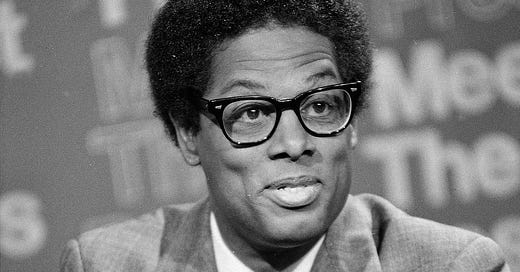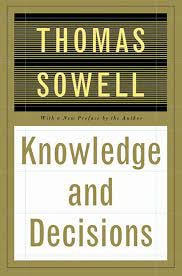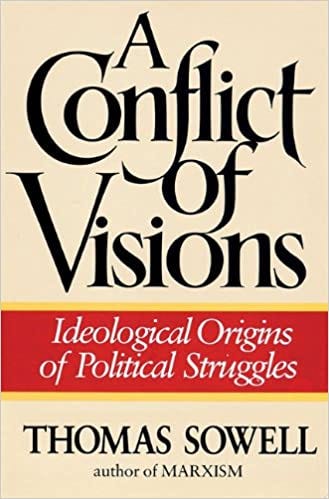Thomas Sowell is an economist who did most of his work in the second half of the 20th century. He writes plainly, argues confidently, and has broad intellectual scope.
He’s also a prominent black right-wing libertarian.
Coleman Hughes elegantly encourages us to read Sowell. He claims that Sowell is one of the towering intellects, not only from the black community, but of our time. Sowell has an impressive rags to riches personal story too: Southern born, Harlem raised, grew up without parents or running water, and temporarily homeless.
Yet Sowell gets underrated, as Hughes laments, for political reasons. He’s a right-wing libertarian, after all.
My guess is that many mildly-interested-in-libertarianism teenagers get introduced to Sowell by watching YouTube snippets of him impressively arguing against unsuspecting proponents of affirmative action, regulation, and welfare.
So like many mildly-interested-in-libertarianism teenagers I watched dozens of Thomas Sowell YouTube snippets in between studying for my exams. Here was this formidably intelligent black intellectual arguing against affirmative action. How much more convincing could it get?
A few years later, I found myself frustrated when reading Sowell's Intellectuals in Society: It made some valid points but, as a whole, was partisan, uncharitable, and intellectually dishonest. It essentially read as a screed against the left.
I then experienced that spooky moment when someone else seemingly transcribes your thoughts when Gwern reviewed the book.
Here’s Gwern (my emphasis):
[T]he promise of the flaps and introduction is not borne out as far as I read. It was not an investigation, either psychological or historical or economic, of intellectuals or recent intellectual history. It was simply a partisan rant bringing up all the old arguments and citations we’ve seen a million times before
Not great, right? Especially for one of the “towering intellects of our time”.
To be fair, some of the “old arguments and citations” are valid. The idea that intellectuals don’t have skin in the game is an important one, despite every Taleb-reading-productivity-guru writing a viral “10 things I learned and you can too” tweet thread on it.
And it’s not crazy to point out that the left may be more susceptible to this particular failure mode. After all, almost the entire academy is left wing.
But Sowell doesn’t give us a reliable account of intellectuals in society as a whole. We most certainly don’t hear any failure modes from the right1.
Gwern again:
By pg30, I abandoned my sporadic note-taking and began playing a little game: write down every time a thinker or politician who could be described as conservative or libertarian is criticized or given as an example of the evils of intellectualism.
Apparently no one on the right end of the political spectrum has ever proposed or implemented any bad idea, ever. Even if I granted the fairness and accuracy of all his descriptions of left-wingers, his conclusions or synthesis would be completely worthless as it omits half the political spectrum!
It’s not like this is unique to Sowell. Tribalism rules everything around me, and all that. As we know: Politics is the mindkiller. In fact, this book reminded me of reading Cordelia Fine on sex differences, who had the reverse problem: Unrelenting in her criticism of bad studies purporting to show sex differences. Yet soft on any claims from the other side.
As we have been warned: We should be weary of isolated demands for rigor.
Gwern (who is sympathetic to the type of arguments Sowell gives) has given up on him:
Life is too short to read Sowell
This is understandable but unfortunate. Sowell is still worth reading, despite the fact we only have a brief stint here on earth.
It doesn’t require you to undertake a sort of voluntary Gell-Mann amnesia either. Remain congnizant of Sowell’s biases. Despite them, Sowell can be insightful. And he lends insight to many topics. We should just be judicious about them. Sure, skip Intellectuals in Society, but there are plenty of other places to start.
Specifically, I’d recommend:
Knowledge and Decisions (1980)
Sowell discusses the idea in Hayek’s classic The Use of Knowledge in Society (which is one of the few old economics papers everyone should still read). Namely, the idea that most knowledge in society is dispersed.
An example is the Italian restaurant owner on the street corner who knows how much excess Tomato paste he has in the backroom which can be used if there is an interruption in supplies.
Most knowledge is like this: Fleeting and local. It is therefore impossible for any single person to exhaustively possess it2.
Sowell then expands on Hayek by discussing how institutions (rather than individuals) process knowledge and make decisions.
(I’ve decided it’s time for a closer re-read of this book. My revealed preference now backs up my proclamations to read Sowell. Specifically, to focus on how it intersects with Deutschian knowledge.)
And:
Conflict of Visions (1987)
Sowell's attempt to describe what drives political differences: What makes people left or right wing?
Sowell proposes an explanation that people are motivated by either constrained or unconstrained visions of society.
His demarcation is essentially about trade-offs. The constrained (or tragic) vision, which Sowell is sympathetic to, emphasises the ubiquity of trade-offs. The unconstrained (or utopian) vision is perhaps more akin to the Green Lantern theory of politics: improving the world is simply a matter of being willing to do it.
Sowell’s visions are a useful lens but I’m not sure it adequately categorizes all political differences. Further, Deutsch is difficult to classify. I’ll unpack these points more in a future piece.
Also:
On Economics
Sowell has several books popularizing economics which are fine (Basic Economics and Facts and Fallacies). However, fine books that popularize economics are dime a dozen. Sowell’s are adequate but hardly required reading3.
On Culture
I’ve got Sowell’s Culture trilogy on my to-read list (not to get confused with Ian M. Banks’s Culture series which is also on the to-read list). Sowell covers the fate of civilizations and apparently pips Jared Diamond’s Guns, Germs and Steel. (That final point may of course be more of a repellent than an encouragement to read it.)
On Race
Sowell is the intellectual father to contemporary commentators Glenn Loury, John McWhorter, and Coleman Hughes. If you’re aware of the above thinkers, then you’ll be roughly familiar with Sowell positions. He’s non-hereditarian but not politically correct either.
Race is of course a controversial topic. Probably the controversial topic. So you may instead rationally conclude that you just totally want to avoid this stuff by any means necessary. Fortunately, as we’ve seen, there’s plenty of other topics Sowell has touched on.
Conclusion
So to answer my initial question: Yes, Sowell is worth reading.
Admittedly, he’s fairly partisan which seems to have grown over time. We need to be mindful of his biases and who is out-group is. (This is of course true for everyone in a boring tautological sense.)
Sowell is insightful. He writes and speaks plainly, and he touches on a broad range of topics. Sounds worth reading.
I suppose you always can watch a YouTube snippet instead.
This isn’t just naive both-sidesism where you want a point against the right for every one against the left. It might be true that one side is worse on a particular issue. We just want signals that the author is identifying the problem in a non-partisan truth seeking way.
If you are after a popular economics book, I’d recommend Hartford’s The Undercover Economist. Yes, it’s crazy popular. Don’t worry, it’s good.







Agreed, Intellectuals and Society gave me a lot to think about.